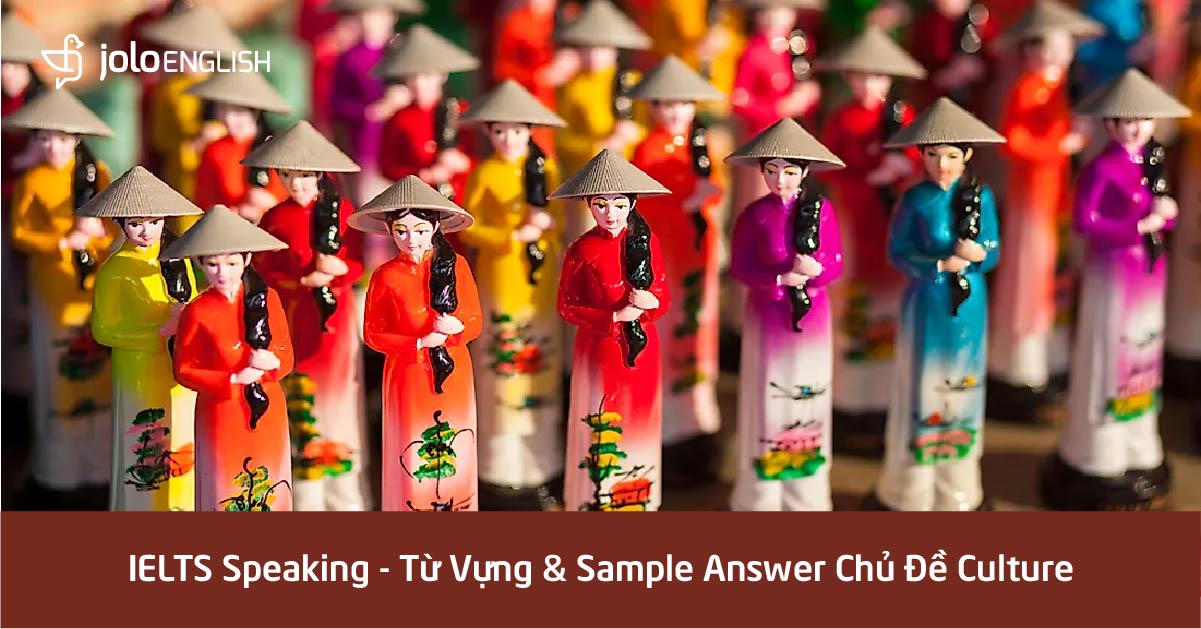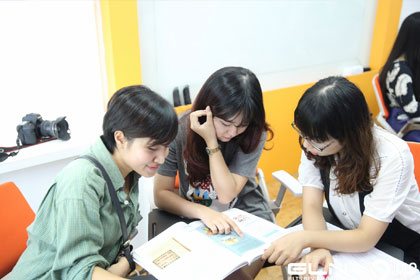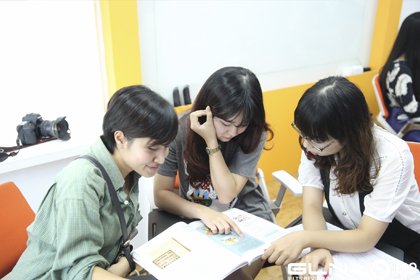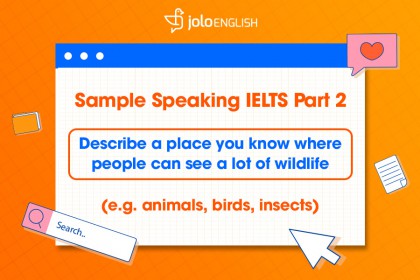Trong các đề thi IELTS, bạn sẽ rất hay bắt gặp chủ đề Culture (Văn hóa). Culture không phải chủ đề quá xa lạ với cuộc sống xung quanh chúng ta, tuy nhiên để viết và nói về chủ đề này, bạn cần có một vốn từ vựng rất rộng và chuyên sâu. Ở bài học hôm nay, JOLO sẽ giới thiệu cho bạn các từ vựng và collocations đẳng cấp để chinh phục Topic CULTURE, đồng thời cung cấp đến bạn bộ sample answers cho IELTS Speaking Part 1, Part 2 và Part 3 về chủ đề này, cùng học ngay và luôn nào!
Học thêm:
- IELTS Writing & Speaking - Từ Vựng, Bài Mẫu Chủ Đề: Sports & Exercise
- IELTS Writing & Speaking - Từ Vựng, Bài Mẫu Chủ Đề: Crime
- IELTS Writing Task 2 & Speaking Part 1 - Bài Mẫu Chủ Đề: Music
- IELTS Speaking Part 1 - Từ Vựng, Sample Answer Chủ Đề: Fashion & Clothes

TỪ VỰNG CHỦ ĐỀ CULTURE
- Acculturation: sự giao thoa văn hóa
- Ancient monument: di tích cổ
- Civilization: nền văn minh
- Folk culture: lễ hội văn hóa
- Ethical standard: chuẩn mực đạo đức
- National identity: bản sắc dân tộc
- Historic site: di tích lịch sử
- Intangible cultural heritage: di sản văn hóa phi vật thể
- Ritual: lễ nghi
- Wonder: kỳ quan
- Cultural festival: lễ hội văn hóa
- Cultural integration: hội nhập văn hóa
- A diversified culture: nền văn hóa đa dạng
- Cultural specificity: nét đặc trưng văn hóa
- Cultural exchange: trao đổi văn hóa
- Cultural uniqueness: nét đặc sắc văn hóa
- Cultural assimilation: sự đồng hóa văn hóa
- Cultural globalization: toàn cầu hóa văn hóa
- Traditional beliefs and customs: các phong tục và niềm tin truyền thống
- A multicultural society: một xã hội đa văn hóa
- People of different cultural backgrounds: người thuộc các nền văn hóa khác nhau
- Indigenous culture: văn hóa bản địa
- Exotic culture: văn hóa ngoại lai, văn hóa du nhập từ nước ngoài
- Time-honoured culture = Long-standing culture: nền văn hóa lâu đời
- Contemporary culture: văn hóa đương đại
- Local culture: văn hóa địa phương
- Deep-rooted culture: văn hóa bám sâu vào cội rễ
- Racism: chủ nghĩa phân biệt chủng tộc
- Race conflict: xung đột sắc tộc
- Melting-pot society: xã hội đa văn hóa, đa sắc tộc
- Discriminate: phân biệt đối xử
- National culture legacy: di sản văn hóa quốc gia
- Culture shock: sốc văn hóa
- Cultural degradation: sự xói mòn văn hóa
- The growing influence of western culture: sự ảnh hưởng ngày càng tăng của văn hóa phương Tây
- The disappearance of some minority languages: sự biến mất của 1 số ngôn ngữ thiểu số
- The loss of traditional cultures = the disappearance of traditional ways of life: sự mất đi các văn hóa truyền thống
- The total ross of cultural identity: sự đánh mất bản sắc văn hóa
- Retain orgirinal characteristics: duy trì những đặc điểm truyền thống
- Preserve / keep/ save / conserve values of culture: bảo tồn, duy trì những giá trị văn hóa
- Renew/ renovate / rebuild historical relics: trùng tu, làm mới di tích lịch sử
- Strengthen cultural bonds between distant communities: thắt chặt mối quan hệ văn hóa giữa các cộng đồng với nhau
- Reinforce cultural exchange: tăng cường giao lưu văn hóa
- Endangers key cultural traditions: làm ảnh hưởng đến văn hóa truyền thống
- Distort traditional values: bóp méo giá trị truyền thống
- Abandon one’s own culture: từ bỏ văn hóa của ai đó
- Adopt a new culture: theo một nền văn hóa mới
- Experience great culture shock: trải qua cú sốc văn hóa lớn
- Instil cultural and traditional values into somebody: thấm nhuần các giá trị truyền thống và văn hóa vào ai đó
GỢI Ý TRẢ LỜI IELTS SPEAKING CHỦ ĐỀ CULTURE
IELTS SPEAKING PART 1
- What is the most important festival in your country?
I think the most important one is the Tet Holiday, which is very much like Christmas in Western countries. It is on the first of January according to the lunar calendar, we have about ten days off. Tet is also an occasion for family reunions. When Tet comes around the corner, most Vietnamese people return to their families to visit their family members, to worship at the family altar, or visit the graves of their ancestors in their homeland as a sign of respect.
- Do you think this festival will still be as important in the future?
Yes, I think so. I would say in this day and age, Tet has lost its original spirit and people often forget the true meaning of Tet holiday, though – I mean, they don’t think about the story of the family gathering. Most adults treat it as a normal holiday in which they can have 2 weeks off to blow off some steam and release stress. For children, I think most of them look forward to the Tet holiday because they can receive lucky money from adults.
- What are some forms of traditional dancing in your country?
One of the unique traditional dances in my country is Southern Lion Dance, which means “mua lan”. It originated from China. Lion Dance is usually performed in the Mid–Autumn Festival and Lunar New Year. As an art, Southern Lion Dance has its principles and rules. A Lion dance usually lasts from 20 to 25 minutes. A lion dance cannot lack the Earth God which means “Ong Dia”. A Southern Lion Dance performance is very animated with instruments such as drums, firecrackers. It is really interesting. It is performed to welcome good things and wipe out all bad things.
- Do you think that traditional dancing will be popular in the future?
I concur with you. In my opinion, traditional dancing is a precious thing in a country. Therefore, they need to be preserved and popular in the future. It is likely that the government will have plans to make the Southern Lion Dance more popular in our country so that Southern Lion Dance will be a vital part of Vietnamese culture. Southern Lion Dance will probably appear more frequently in special ceremonies. It is worth being preserved.
IELTS SPEAKING PART 2
- Describe a foreign culture that you are interested in
You should say:
- what culture it is
- how you know about it
- what differences there are between that culture and your own
- explain why you like that foreign culture
Sample Answer:
Every country has its own culture to follow. Different countries have different cultures. A culture is passed on from one to another, remaining unchanged with every passing time. The celebration of Christmas and Thanksgiving in foreign countries grabbed my special attention.
I came to know about it mostly from storybooks, movies, and web series. The American sitcoms widely or descriptively show how beautifully they celebrate the two occasions.
Christmas is all about the birth date of Jesus Christ. But they celebrate Christmas royally. They bake cakes, decorate Christmas trees, visit the church, and even give gifts to one another. Our country celebrates it but not in such a grand manner. Our country does not have Thanksgiving celebrated like them but has other cultures to follow.
Both events mean celebrating a single day from your busy schedule with your loved ones. Thanksgiving is celebrated in American countries as a mark of gratitude for the harvest and other blessings of the past year. It is mainly a way of showing how thankful they are for the food they get and for every good thing happening in their life. I think it’s a pretty culture to follow. Christmas on a snowy day is beautiful. I think it’s a very good culture to sip hot chocolate with your family and ponder about the day.
- Describe a traditional product in your country
You should say:
- what it is
- when was the first time you tried it
- how to make it
- how you like it
Sample Answer:
I’d love to talk about rice, the most important agricultural plant in my country.
Ever since I was in my early elementary years, the rice plant has appeared in almost every subject, from literature to natural science to geography. And even in real life, the rice plant can be spotted all across the countryside around Vietnam.
It never ceases to amaze me how such a simple plant could support a whole nation’s economy. Up to this day, millions of Vietnamese families are still dependent on the cultivation of rice to make ends meet. And the fact that Vietnam has become one of the world’s leading rice exporters is more solid proof of the relevance of this plant in my country. Besides this, rice has been an indispensable part of the main meal of most families for centuries and children practice the habit of eating rice from a very young age, and as for the older generation, they cannot go a day without rice in some form or another.
Over thousands of years, the rice plant has played a really important role in Vietnamese culture and many traditions and ceremonies originate from the farmers' hopes for an abundant crop, and many of these traditions are considered important established customs to foreign visitors. I think that the rice plant has become one of the greatest symbols for the Vietnamese spirit and deserves large appreciation from all generations.
IELTS SPEAKING PART 3
- Do you think it’s important to know about other cultures?
I do think it’s extremely important to learn about other cultures. Not only can you find out interesting things, but it makes it easier to interact with those people if you ever come in contact with them. Also, it makes it a lot easier to do business with those cultures. It’s important to be educated about the world and not just shut yourself into your own country.
- How can we benefit from learning about other cultures?
Several ways that people can benefit from other cultures are in business, personal relationships, and just in self-improvement. In business, it is necessary to know a little bit about whatever culture you plan to work with. For instance, I think in Muslim cultures, shaking hands with your left hand is considered extremely rude. If you didn’t know that, it could hurt your chances of doing business. Also, it’s important just to improve yourself by learning as much as you can, and culture is a good subject.
- What do you think is the best way to learn about another culture?
Obviously, the best way to learn about a culture is to go there and experience it. If you can get a feel for the culture firsthand, it will be a lot easier to pick things up, But I also believe that you can learn a ton about other cultures just by reading books about them. Reading about people’s experiences in foreign lands is the next best thing to being there.
- Do you think that learning foreign languages can help us understand foreign cultures?
I’m not sure that just learning the language is a good way to learn about a culture, but most places where you would learn a language would help you learn about the culture, so indirectly, yes. The language alone isn’t great for understanding culture. For instance, German is a really harsh language, but Germans aren’t harsh people. You really need to study more than the language if you want to get to know a culture.
- Do you think it’s better to go overseas to study a foreign language or to study it in your home country?
I think it is better to study a language in its native country. When you do that, you are engulfed in the language and forced to encounter it outside of the classroom. Otherwise, your only exposure to the language is when you’re studying or in the classroom. I know firsthand that when learning a foreign language in your home country, it is easy to lose what you have learned.
- What is your understanding of the term “globalization”?
Globalization, in my mind, is the idea that the world is becoming smaller, so societies can interact and exchange culture more easily and more efficiently. Unfortunately, because some countries are richer and have more influence than others, certain cultures get spread around more than others. On the whole, however, globalization is a good thing because it is not the only culture that gets spread, but things like information and medicine can help people.
- Do you think globalization is a good thing?
Yes, globalization has its problems, but for the most part, it is good for most people involved. Some people have different opinions because they are really concerned with the loss of culture, but for me, the benefits outweigh the drawbacks. People have access to more information, so diseases can be better treated, food can be made more efficiently, and goods that make people’s lives easier are now available.
- Do you think it’s easier to learn about other cultures today than it was before?
Yes, of course, it is. All you have to do is to look at art from long ago, about foreign cultures and you can see the lack of knowledge people had. Today, with the Internet and the number of books available, it is almost impossible to be ignorant. It is so easy to learn about anything you want.
Trên đây là trọn bộ kiến thức về từ vựng, collocations và bộ câu hỏi mẫu cho IELTS Speaking Topic CULTURE. Với khối lượng lớn kiến thức này, các bạn nên ghi chép lại từ mới thật cẩn thận và học hàng ngày, kết hợp sử dụng chúng vào bài Writing và Speaking cho thật nhuần nhuyễn nhé. Chúc các bạn học tốt!
Nếu bạn muốn nâng cao các kỹ năng cần thiết trong bài thi IELTS nhưng chưa biết bắt đầu từ đâu, đừng quên tham khảo các khóa học tại JOLO English tại đây nhé!
--------------------------------------
Tìm hiểu thêm các khóa học tại JOLO English - Hệ thống trung tâm dạy Tiếng Anh uy tín nhất tại Hà Nội và HCM :
- Khóa học Luyện Thi IELTS tại Hà Nội và HCM
- Khóa học Tiếng Anh Giao Tiếp tại Hà Nội và HCM
- Khóa học Tiếng Anh cho trẻ em
Hệ Thống Trung Tâm Anh Ngữ JOLO:
- Hà Nội: 093 618 7791
- TP. HCM: (028) 7301 5555
- JOLO: Số 4, ngõ 54 Nguyễn Thị Định, Hà Nội
- JOLO: Số 27 Trần Đại Nghĩa, Hà Nội
- JOLO: Số 67 Thụy Khuê, Hà Nội
- JOLO: Số 7, đường số 2, Cư Xá Đô Thành, Q.3, Tp.HCM
- JOLO: Số 2, tầng 1, tòa C2, Vinhomes Central Park, Q. Bình Thạnh, TP.HCM
- JOLO: S3.020215, Vinhomes Grand Park, P. Long Thạnh Mỹ, TP. Thủ Đức, TP. HCM






















